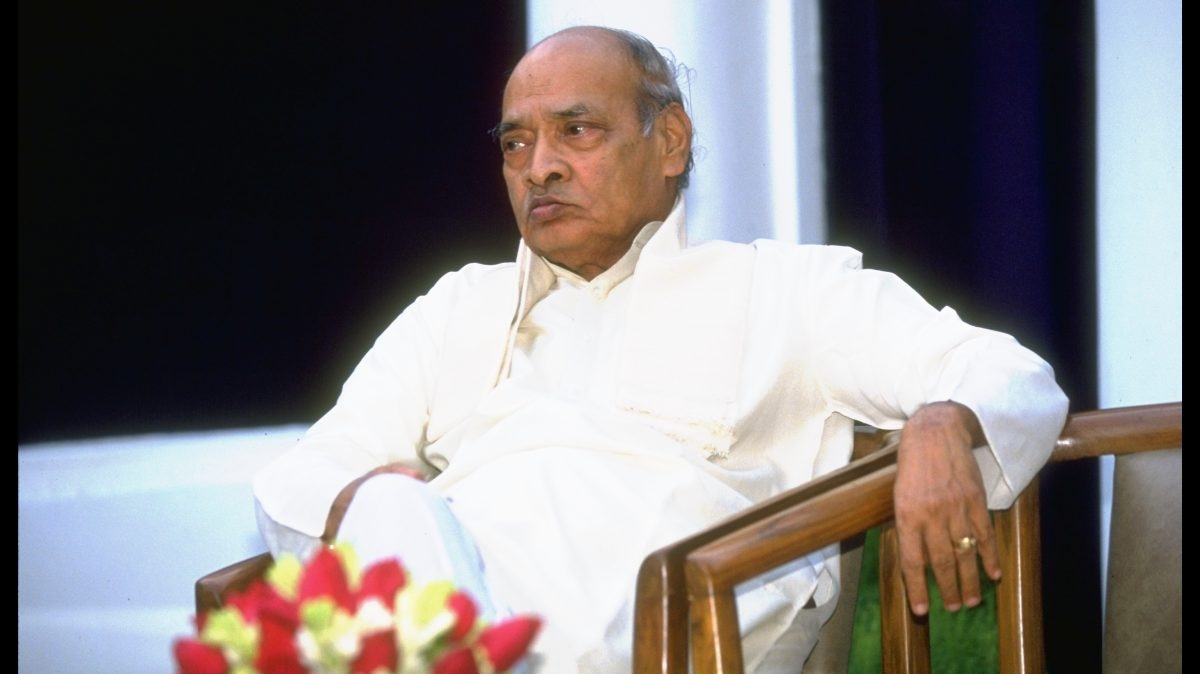New Delhi: Recognising that it had faltered in undermining the achievements of former Prime Minister P.V. Narasimha Rao, as also in bifurcating its erstwhile stronghold, Andhra Pradesh, on Friday, the Congress high command attempted to make amends for its monumental mistakes. Interim president Sonia Gandhi, who had not even allowed Rao’s mortal remains to be brought inside the premises of the party headquarters at 24, Akbar Road, following his death in 2004, showered lavish praise on him, while congratulating the Telangana unit of the Congress for organising such a befitting function to launch Rao’s birth centenary celebrations.
Apart from Sonia Gandhi, her predecessor, Rahul and former Prime Minister, Dr Manmohan Singh also paid rich tributes to the scholarly politician, regarded as the “father of economic reforms in India”. It was during his tenure as the head of the government, that Manmohan Singh, as the Finance Minister, initiated the revolutionary steps to overhaul and re-energise the economy.
The political significance of this public display of adulation by its top leaders was to prevent the BJP or any of the regional parties from appropriating his legacy. Telangana Chief Minister, K. Chandrasekhar Rao, has already urged the Central government to confer the Bharat Ratna on the former Prime Minister, and a section of the Sangh Parivar is expected to endorse this demand on account of the high regard for him. After Friday’s elaborate eugolising of Rao, the Congress, which at one time was hesitant to concede his immense contribution, would be compelled to also make a similar pitch for a Bharat Ratna.
The reaching out to reconnect with Rao is also directed at a course correction, which the Congress is seeking in respect of Andhra Pradesh and Telangana. Telugu pride had been wounded when the party had tried to minimize his role. However, at that stage, Y.S. Rajasekhar Reddy had prevented any further damage, by ensuring a grand victory both in 2004 and 2009 for the Congress. YSR was the undisputed leader from the state till he was alive, but after his tragic death in a helicopter crash in 2009, Sonia Gandhi and her aides, led by P. Chidambaram, announced the creation of a separate Telangana state, carved out of an undivided Andhra. While Sonia Gandhi feared that YSR’s son, Jagan Mohan (now CM of Andhra), would upstage Rahul, Chidambaram wanted to eliminate any challenge obstructing his emergence from being the sole leader hailing from the southern part of the country. Several senior Congress leaders were accomplices to this political hara-kiri, since the new state translated into new real estate avenues for the fresh capital.
It is a well-known fact that although Rao’s candidacy for the Prime Minister’s position, following the gruesome assassination of Rajiv Gandhi, had the backing of Sonia Gandhi, yet it became very clear early on, that she developed and harboured a deep aversion for him. It was initially with her approval that in 1991 her one-time close associate, Makhan Lal Fotedar, had persuaded Sharad Pawar to withdraw from the Prime Ministerial contest within the party, thereby allowing Rao to occupy the august position.
Rao was faced with the Herculean task of running a minority government—with outside support of several smaller political outfits—and despite all odds, managed to complete his five-year tenure. Had it not been for the creation of Congress (Narayan Dutt Tewari), an organisation floated with Sonia Gandhi’s blessings, and comprising dissident leaders, such as Arjun Singh, Tewari and Fotedar, Rao may have continued, perhaps, for another term.
Rao was portrayed by this section as a leader who played a latent role by not preventing the demolition of the disputed structure in Ayodhya. Many of his critics described him as the “First BJP Prime Minister of the Country” alluding to his formative years in Nagpur, where the RSS headquarters are located. However, undeterred by the criticism, Rao outsmarted his opponents within the party, particularly from Northern India, by implicating them in what came to be known as the Jain Diaries Hawala scandal. Those whose names figured in the controversial diaries included L.K. Advani and Madhavrao Scindia, amongst various others. This resulted in an out-and-out open revolt within the Congress, while compelling Advani to declare that he would not be a BJP nominee, till his name was cleared of the charges levelled against him. The 1996 poll outcome culminated in the BJP emerging as the frontrunner, with Rao bowing out of active politics and handing over the party reins to Sitaram Kesri.
Although his exit from the corridors of power may have been unceremonious, yet his varied contributions went far beyond several other Prime Ministers. His comprehension of both the national and international situation was evident from the fact, when he strategically decided to send Atal Behari Vajpayee, the then Leader of Opposition, to head the Indian contingent to Geneva for the Human Rights Commission. Pakistan had moved a resolution at the forum to censure India for its “record of human rights violations” in Jammu and Kashmir. Vajpayee and his team succeeded in thwarting this Pakistani design. Rao had also nominated Subramanian Swamy as the Chairman of the Commission on Labour Standards and International Trade, providing him with a Cabinet rank. These choices reflected his inclusive approach in solving complex problems.
Rao, who had done his political apprenticeship under Indira Gandhi, unfortunately, never received his due from her family, which later on went on to inherit Indira’s legacy. Sonia’s intense dislike for him, spurred her to influence the party’s changed strategy, which deviated from the original secular ideology. It was at her behest that the Congress tilted towards the minorities, a perception that subsequently in the 2014 Parliamentary polls eventualised in the humiliating defeat of the party.
Rao was an accomplished
Rao was a statesman and a blue-blooded Congress politician who had mastered the art of both outwitting his opponents while simultaneously leaving them in awe of him. A tall Prime Minister, from outside the Nehru-Gandhi fold.

